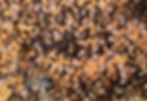L a n d s c a p e A r c h i t e c t u r e
DALE DESIGN, INC.
Our Beekeeping Story
We have been beekeepers since June 2012 when we adopted a wild swarm of honeybees, resting on a branch of an apple tree in the historic Episcopal Church Cemetery in Harvard Square, Cambridge, MA. We installed the bees in their home, our brand new hive on our suburban 1/3-acre in Winchester, MA. Our first harvest, in November 2013 (very late in the season by New England standards), yielded 75 pounds of Fall Honey made dark gold by Goldenrod, Asters, and Purple Loosetrife.
We installed our second hive in April 2014 and can report the Queen is alive and well and the colony thrives. Sadly, in July 2014 we lost our original colony to swarming and then to a wax moth invasion. We've cleaned our woodware to be stored for the winter, and we'll establish a new hive in these brood boxes in Spring 2015.
We are members of the Middlesex County Beekeepers Association and the Massachusetts Beekeepers Association. Our suppliers and mentors are Rick Reault at New England Beekeeping Supplies in Tyngsboro, MA, and Nancy Mangion at The Beekeepers Warehouse in Woburn, MA.
Do not feed honey to children under 1 year old.
We installed our second hive in April 2014 and can report the Queen is alive and well and te colony thrives. Sadly, in July 2014 we lost or original colony to swarming and then a wax moth invasion. We've clean our wood ware to be stored for the winter, and we'll establish a new hive in these brood boxes in Spring 2015.
We are members of the Middlesex County Beekeepers Association and the Massachusetts Beekeepers Association. Our suppliers and mentors are Rick Reault at New England Beekeeping Supplies in Tyngsboro, MA, and Nancy Mangion at The Beekeepers Warehouse in Woburn, MA.
Do not feed honey to children under 1 year old.

The Dale's, suit-up for an inspection.

Almost all fruiting plants depend on the honeybee for pollination.

Virtually all inspections are to determine the health and productivity of the colony.

If everything goes well in the colonies then it should not be long before it’s time to extract honey!

Much of our New England honeybee populations live in beekeepers' hives, native bee populations have dropped dramatically due to habitat destruction.

Vanessa (Cynthia) virginiensis, American Painted Lady Butterfly

Honeybees account for 80% of all insect pollination. Without such pollination, we would see a significant decrease in the yield of fruits and vegetables.

When inspecting a hive, it is important to notice any abnormalities.

Honeybees use these cells for storing food and raising brood.